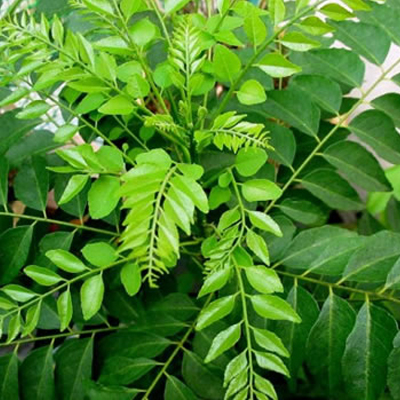Nutritional value:
calcium, phosphorous, iron, magnesium, copper, and minerals. It also contains various vitamins like nicotinic acid and vitamin C, vitamin A, vitamin B, vitamin E, antioxidants, plant sterols, amino acids, glycosides, and flavonoids.

Consumption of curry leaves is beneficial for many medical conditions and in maintaining good health.
Curry leaves for hair :Curry leaves are excellent for source of nutrients for hair growth. Regular consumption of curry leaves strengthens hair, cures dandruff and prevents premature graying of hair.
Curry leaves for skin:Application of curry leaves helps in treating bruises and burns as well as rashes and insect bites. The high content of antioxidants and vitamin C also helps to keep the skin supple and young.
Curry leaves for liver:Eating curry leaves can keep your liver healthy. They are beneficial in liver conditions such as cirrhosis. Curry leaves also protects the liver from various infections.
Curry leaves for eyes:Curry leaves are useful in eye problems such as cataract. Rich in vitamin A; curry leaves protect the eyes, keep the retina healthy and prevent vision loss.
Curry leaves for anemia:Curry leaves are an excellent source of iron and its consumption can help people who suffer from anemia. Another benefit of curry leaves in anemia is that they are also a good source of folic acid, which aids the body in absorbing iron. Without adequate folic acid in the body, the iron is excreted from the body without proper absorption.
Curry leaves for heart:Curry leaves help lower the levels of bad cholesterol in the body. Curry leaves aid in weight loss, which removes extra pressure from the heart. The antioxidants present in curry leaves are beneficial in keeping the heart healthy.
Curry leaves for digestion:Health benefits of curry leaves for good digestion along with their aromatic flavor are the reasons for popularity of curry leaves usage in food.
nutritional value: calcium, phosphorous, iron, magnesium, copper, and minerals. It also contains various vitamins like nicotinic acid and vitamin C, vitamin A, vitamin B, vitamin E, antioxidants, plant sterols, amino acids, glycosides, and flavonoids.
